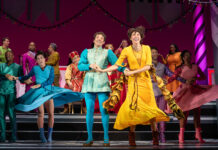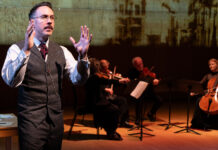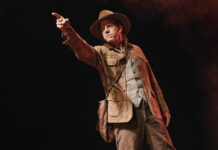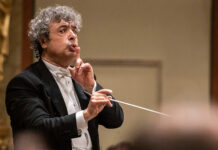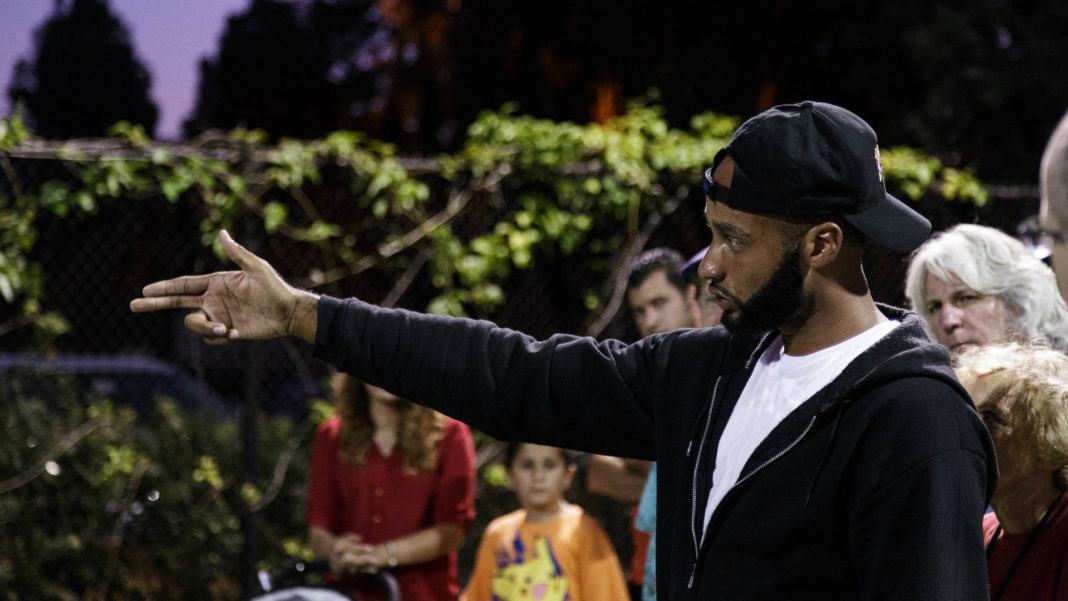In the slightly more than three years since Keith A. Wallace first premiered The Bitter Game, a play that addresses the relationship between police and people of color, we’ve seen a lot of controversial police killings of black men. While more famous cases like Eric Garner and Michael Brown had already happened, men like Philando Castile, Antwon Rose II and just this week, Jemel Roberson, more recently became part of a growing problem.
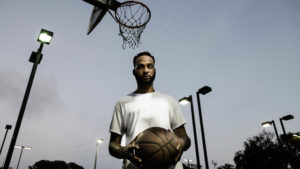
The Bitter Game, which is a one-hour, one-man show opening tonight at the Wallis Annenberg Center for the Performing Arts, stars Wallace (who also write it) as he tells a story based on his own experiences being both a witness to violence and someone who has had difficult encounters with police.
I spoke by phone with Wallace a few weeks ago about The Bitter Game and the challenge of doing a show that remains more topical as the days, weeks and months go by.
How has this show evolved since you first premiered it three years ago?
Aside from me just allowing myself to take more of a journey and take the journey with the audience from a celebratory to more serious tone, I’ve been able to finesse and play a little bit more. When we first premiered it, it was a commission for a site-specific festival. Then the following year we came back with another outdoor version. As a creative team (Deborah Stein co-created The Bitter Game) it taught us that it has a chance to live in difference spaces. At the Wallis we’re returning back to outdoor staging which is exciting and we’re cooking up new ideas to make it fresh.
Do shifting current events mean there’s a regular updating of The Bitter Game?
There’s a roll call of names that exists in the play – victims of police violence. And that list continues to grow and it has grown over the time I’ve been doing the show.
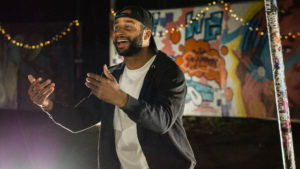
You said in your Ted Talk that “the problem with black pain is that it is often invisible and it is supposed to be shouldered by the individual.” Do you imagine a world in your lifetime where that won’t be the case?
The optimistic side of me says yes. The more realistic side says I do see the world changing and I do believe it will be better before I leave. The thing that encourages me to stay committed to this fight is there are many people who came before me whose shoulders I stand on so I could have the space to create this play and the space to have this platform. If I’m being honest, I don’t think the world will completely change before my time spent here is up. But I do see a trend where people are listening and conversations are being had. Honestly, and more importantly, now it’s not just the individuals who are marginalized and oppressed, there’s solidarity from non-people of color saying this is an issue we need to pay attention to.
What impact can telling this story as a piece of theatre have with people who are more prone to agreeing with you?
What theatre has the opportunity to do is blur the lines of differences between us. It lowers your defenses. When you come to a theatre you are coming to enjoy something, but it has tremendous power to impact and teach people and encourage empathy. Yes I do believe that art should and can entertain. But we have a responsibility as citizens of the world to advocate for what’s right. For me theatre has the power to do that. You get people from all walks of life into a communal space with their defenses lowered really to experience and be affected.
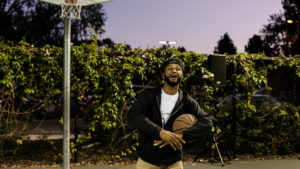
You started this show a year before Donald Trump was elected president. Does The Bitter Game become more important as a result of that election?
I feel like the piece is today as important as it has ever been. We’re starting to see the ugliness of racism and race baiting, but it’s not new to me. While I’m disgusted by a lot of what Trump does and a lot of the vitriol he spews, I’m not necessarily surprised by it. What I appreciate about this administration is it is waking up the rest of the country that hasn’t had to think about it or hasn’t experienced it. I’m glad that this piece came into fruition when it did. I feel like people are hungry for, and are looking for, an opening to this dialogue.
In a 2015 interview with The Village Voice, you discussed this play and the work you continue to do to be a “tool of sensitivity for law enforcement.” Have you specifically performed The Bitter Game to an audience of police officers?
I have been trying for years to find an opportunity to get just in front of law enforcement. I haven’t been able to do it yet. What I’ve been able to do in San Diego and Maryland and Cambridge is we’ve had groups of officers who came and participated in post-show conversations. That’s always an interesting experience. My ultimate goal is one day this show, in the same way we have curriculum built around certain works in high school, this play or portions of it can be taken and put into cultural sensitivity training.
When police are held up to inspection in popular culture, as Bruce Springsteen did with his song American Skin (41 Shots), they tend to boycott or threaten to boycott performing security for said artist. Why has law enforcement seemed to take on a them-versus-us mentality and what can be done to bridge those gaps?
Ah man, that is such a big question. I think a part of it is fear. I’m being honest, it’s fear on both sides. When I interact with law enforcement or even see a police uniform or marked vehicle, there’s a sense of fear, dread and terror that comes across me. That’s because of my prior experiences with law enforcement. The us-versus-them stems from fear. I don’t hate cops. if something goes down, I’m calling the cops. They are sworn and deputized to protect us and our tax dollars pay to have that right as an American citizen. But the reality is they do a dangerous job and there are a lot who do it well and are in it for the right reason. There is enough embedded in the culture that works to negate the good that happens.
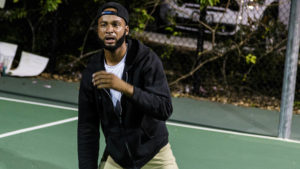
To rectify that is a bit of a challenge. But I believe the onus of that is, unfortunately, on the part of law enforcement to do that. As a lay person, a regular citizen, I may not know all the laws. I may not know all the power that is granted to me legally or culturally as those who carry a weapon. There needs to be more cultural sensitivity training, more police and public interfacing in situations that are heightened around crime. In a nutshell there needs to be a more concerted effort to communicate and to understand what’s happening on either side of the line.
I speak and I have this platform, but am I affecting the right people? Part of the back door dealings that nobody sees is me on the phone with the marketing director asking “how are we making tickets available to people who don’t know The Wallis or can’t be there?” Because those people reflect me. It’s subscribers and catering to certain demographics of patrons that keep the doors open. But at some point, when do we say the things that need to be said rather than what people want to hear?
All photos by Jim Carmody


